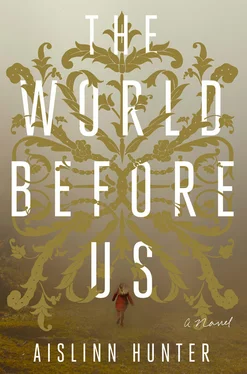Jane tore a piece of paper off the scratch pad that Luisa kept in the oak sideboard and gave it to Lily. Then she pulled up a chair and watched as the five-year-old drew a red sun and then a blue flower and a blue whale swimming through puffy yellow clouds. Lily pushed the drawing toward Jane when she was done and then took it back at the last second, adding five blue squiggles in the top right-hand corner.
“What are those?” Jane asked.
“A secret.”
“Oh. Can I guess?”
Lily nodded.
“Birds?”
“No.”
“Bumblebees?”
“No.”
“Airplanes?”
“No.”
“Drops of rain?”
“No.”
“Flying girls?”
“No, no, no.” She smacked her lips, satisfied.
“How about the flags of invisible cities?”
Lily, liking that, giggled.
When they first set out along the trail William stayed with Jane and Lily, pointing out various kinds of Rhododendron and Chimonanthus , cupping the glossy plant leaves in his hand and explaining that the shrubs liked acidic soil best, that they bloomed in winter and the flowers were pungent—“spicy smelling, actually; quite lovely”—which made Jane think of the cologne she’d found in William’s bathroom cabinet, its woodsy clove scent. He’d started to give a brief history of the estate and of the Farrington family—“George was a great botanist, his brother an amateur geologist”—trying, and failing, to make it interesting to Lily, who kept interrupting to complain that she was too warm or thirsty. After ten minutes of walking together, he pulled out his notebook and said he was going to get started, that he wouldn’t be far. Sometimes after that they’d round a corner and see him in the distance standing near a bed of fern, or just off the lake side of the footpath, a handsome thirty-five-year-old man in beige trousers and a navy jacket, two canvas specimen bags around his waist, wellies up to his knees in case he wanted to scramble down the verge, down the muddy ravine.
The trail was narrow but flat. The Farrington estate had been in the hands of the local Trust for twenty-some years and over that time the path had become a popular walking trail, as much for the three caves at the end of it as for the rare alpine and Asian specimens George Farrington had brought back from the Himalayas and planted in the late 1870s. The farther in they walked, the cooler it became, though the temperature was changeable: one minute Jane and Lily would be walking in shade and Jane would get goose pimples, then a few minutes later they’d come to a section of clear sky where sunlight blanketed the trail. The stickiness of the drive up and the summer heat followed by the blue coolness of the woods reminded Jane of summers at her family’s cottage at the Lakes when their mum was between research posts or teaching semesters — summers full of walks and hill climbing. Jane had been twelve and Lewis ten and bratty the last time they’d gone up. Lewis’s favourite pastime that year was sailing through the main room of the cottage to thwap whatever book Jane was reading with his hand before presenting himself to their mum and stating, “Claire, we need milk,” or “Claire, I’d like a microscope.” And Claire would glance up from the clutter of papers on her desk under the open stairs and say, “Of course, Mr. Standen, whatever you want.”
About twenty minutes into their walk, the trees to Jane and Lily’s left thinned, and Jane could make out the edge of a flat pasture at the top of a sloping rise, a ribbon of sun along its border. After a while a stone fence took its place, and every now and again one of the sheep in the upper field would baa and Lily would stop and stare at the ridge as if she expected to see a lamb standing there. William, by then, had gone even farther ahead, moving through the brome and couch grass, the troughs of fern. When he’d been gone for a while Lily started to pick up leaves and snatch bits of bushes, trying to imitate her father. Wiping her hands on her red dungarees and traipsing along beside Jane, she asked a litany of questions that all began with Why? or How come? or What if? Jane tried her best to answer, to explain why some animals had stripes and some spots, why leaves float and why if Luisa said that Lily’s mother was in heaven, then that was clearly where she was. Lily made a fish face at that and blew on the key that swung from a white ribbon around her neck. It was the key to Jane’s grandparents’ house. Lily had noticed it on the ribbon wound around Jane’s wrist during lunch at the pub in the village; she’d gently tried to tug it off while Jane was doing her best to sit up straight and have a grown-up conversation with William over soggy cod and chips.
“Did your father put you up to the cello?” he’d asked.
“No. Well, sort of.”
“It must be difficult — the expectations people have.”
Jane had stabbed at a pea with her fork and missed, and the tine had made a scraping noise on the plate; she’d checked to see if William noticed. “We don’t see him much, unless he has a concert in London. Right now he’s back in France.” She heard herself say “back in France” and liked how important it sounded, liked how it made her father a busy man, famous, foreign.
On her second day minding Lily, when she’d started to look more closely around William’s house, she’d rifled through the music collection and saw that he had Henri’s Liszt recording and Paganini caprices, which were her favourite. There was a strange electric pleasure in seeing her father’s image on the CD cover in William’s house — it was a still from one of his Berlin concerts, the violin tucked under his chin, his black hair just long enough to toss back with effect and an expression she sometimes thought of as rage on his face.
“I’ve never seen him play—” William began, stopping when he saw Lily tugging at Jane’s wrist. He reached across the table and gently grabbed her hand. “Lily, stop that.”
“It’s fine.” Jane smiled at William and loosened the strands of the ribbon until she could loop the whole thing off her wrist. “You can play with it. Just don’t lose it.” She handed Lily the key and the girl lit up, started spinning it. Jane glanced at William, hoping she’d done the right thing, that he’d think she was a good minder, that he’d go back to asking her questions about her life. Hoping, too, that this wanting to get to know her meant something, that it was a kind of affection.
William spent most of the walk taking samples and photographs and jotting plant names on a map of the trail. He’d walk ahead and wave at Jane before rounding corners, a signal that he was going farther along, that he wasn’t scrambling down toward the lake or up toward the pasture, that he was only around the bend. Lily, bored, pulled the ribbon around her neck taut and held the key out in front of her chest, making up a singsong— up, down, up, down . She flicked the key again and again with her index finger while Jane stood in the middle of the path waiting for her: a five-year-old trundling along at her own pace.
Because Lily was dawdling, Jane tried to think of a game. If she thought up a game, Lily would forget the key and it would be easier to get it back from her. So Jane looked at the elm and sycamore, then over to the slope of meadow grass and ivy that rolled down to the ravine bottom, and then back to the trail. Every fifty feet or so on the edge of the path there were short brown posts with numbers painted in green on top. They lined the edge of the woods on the pasture and lakesides, marking the various bushes and shrubs George Farrington had brought back from his plant-hunting expeditions in Burma, China and Tibet. At the start of the trail, when William had told Jane and Lily about the botanist, he’d shown them Paeonia suffruticosa and Viburnum farrington . The Viburnum shrub was sweet-smelling with sprays of white flowers. Jane had picked a few of the buds when William wasn’t looking, dropping them into her pocket so she could touch the petals with her fingertips while she walked.
Читать дальше












